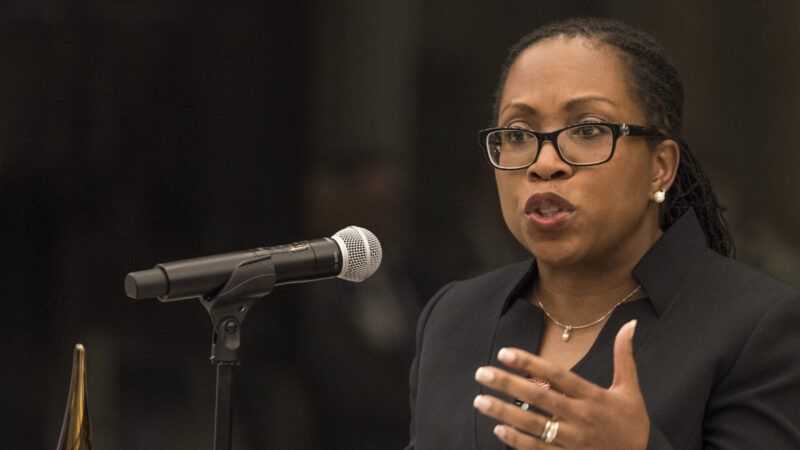A Promising Qualified Immunity Decision From a Potential Biden SCOTUS Nominee
Judge Ketanji Brown Jackson denied qualified immunity to the officers involved in Patterson v. United States.

President Joe Biden is reportedly considering naming federal Judge Ketanji Brown Jackson to fill the vacancy on the U.S. Court of Appeals for the District of Columbia Circuit that will soon be left when Judge Merrick Garland leaves that court to assume the role of attorney general. Sometimes known as the "second-highest court in the land," the D.C. Circuit is frequently a stepping stone to a spot on the U.S. Supreme Court. In other words, if Biden names Jackson to the D.C. Circuit, it is a good sign that she is on Biden's SCOTUS shortlist.
So what does Jackson's judicial record tell us about her?
Criminal justice reform advocates will likely be heartened by Jackson's decision in the 2013 case Patterson v. United States. At issue was the arrest of an Occupy D.C. protester named Anthony Michael Patterson for using profanity in a public park. According to one of the arresting officers, Patterson yelled "fuck white people" when he saw several Tea Party activists on the scene at an Occupy D.C. protest in Washington's McPherson Square park. After another officer told Patterson to stop cursing, Patterson allegedly yelled "fuck" a few more times. Patterson was ultimately arrested for disorderly conduct. That charge was dropped a month later.
Patterson sued the officers over the bogus arrest. Here's how Jackson described the suit in her opinion for the U.S. District Court for the District of Columbia: Patterson "alleges that Sergeant [Todd] Reid violated Patterson's First Amendment rights when he ordered Officers [Jennifer] Lemke and [Matthew] Cooney to arrest Patterson solely based on the content of protected speech in the absence of probable cause to arrest him for disorderly conduct and that Officers Lemke and Cooney violated Patterson's First Amendment rights when they complied with that order and actually arrested him."
The officers moved to have the lawsuit dismissed. Among other arguments, they maintained that their actions were shielded from civil litigation under the doctrine of qualified immunity. According to the Supreme Court's 1982 ruling in Harlow v. Fitzgerald, state actors are entitled to immunity from civil suits arising from their official conduct so long as the conduct that they're being sued over "does not violate clearly established statutory or constitutional rights." In effect, the officers took the position that it was not "clearly established" that the First Amendment prevents somebody like Anthony Michael Patterson from being arrested for using certain four-letter words in public.
Jackson not only denied the officers qualified immunity, but she practically laughed them out of her courtroom. "The right to be free from a retaliatory arrest in the absence of probable cause is clearly established in this jurisdiction," she wrote. Indeed, "a police officer is unquestionably on notice that arresting a speaker solely based on the content of his speech and without probable cause to believe that he has committed a crime is a violation of the First Amendment."
The case easily could have turned out differently in the hands of a different judge, one who was perhaps more deferential toward the police or was simply more amenable to pushing qualified immunity doctrine to the hilt. After all, other federal judges have awarded qualified immunity in cases of truly egregious police misconduct.
Jackson took a different approach. "Because no reasonable officer could conclude that there was probable cause to believe that Patterson was committing disorderly conduct on the facts as alleged in the complaint," she concluded, "the complaint ably supports the claim that Patterson was arrested in retaliation for his protected speech and that the individual officers therefore violated Patterson's clearly established First and Fourth Amendment rights."

Show Comments (86)